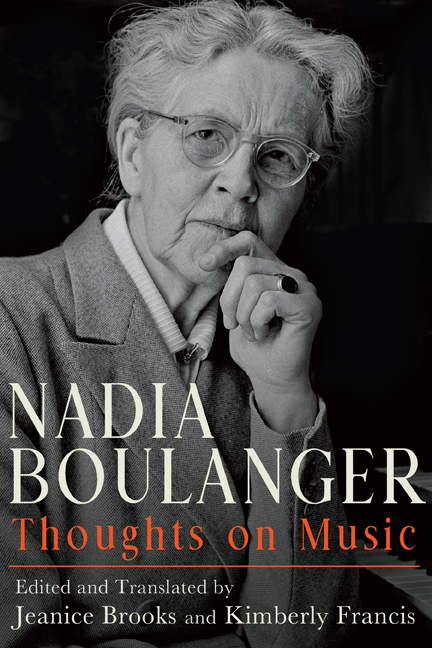Book contents
- Frontmatter
- Contents
- List of Illustrations
- Acknowledgments
- Editorial Apparatus and Critical Notes
- Note on Translations
- List of Abbreviations
- Timeline of Nadia Boulanger’s Life
- Introduction
- Part One Journalism, Criticism, Tributes
- Part Two Lectures, Classes, Broadcasts
- Bibliography of Nadia Boulanger’s Published Writing
- General Bibliography
- Index
In Memoriam: Speech on the Twenty-Fifth Anniversary of Gabriel Fauré’s Death, 1949 (complete text)
Published online by Cambridge University Press: 15 October 2020
- Frontmatter
- Contents
- List of Illustrations
- Acknowledgments
- Editorial Apparatus and Critical Notes
- Note on Translations
- List of Abbreviations
- Timeline of Nadia Boulanger’s Life
- Introduction
- Part One Journalism, Criticism, Tributes
- Part Two Lectures, Classes, Broadcasts
- Bibliography of Nadia Boulanger’s Published Writing
- General Bibliography
- Index
Summary
Ladies and gentlemen,
Emmanuel and Philippe Fauré-Fremiet have done me the extraordinary honor of asking me to say a few words this morning on the twenty-fifth anniversary of the death of their father.
You are aware of, and understand, the emotion with which I thank them for this, I am sure.
Twenty-five years have passed; our sorrow remains the same, in proportion to the loss that was suffered.
All of us, all of his pupils, loved Gabriel Fauré. His death deprived us of a presence whose value is impossible to measure without having lived in the shadow of his brightness. Time is unable to console us, and it is with the same heart, the same tender respect, the same gratitude as in the farewell that we addressed to him at the moment when he had just left us, that we address him today.
Then we had only—we could have only—one thought: our Teacher, our friend, is no longer here, we will no longer see the noble, handsome face, the slightly distant gaze, the sweet smile that always welcomed us with the same generous and unfailing goodness. We will miss his advice, so discreet, so productive …
We felt alone, impoverished, and very sad. Our grief has not diminished, but something has changed, something very important for Fauré and for music, during the years that have passed—and joy is mixed with our sorrow, and somehow dominates it. For reasons that have changed the course of things, have brought a more exact sense of tradition, a truer evaluation of quality, of innovation, Gabriel Fauré's work is finally being judged at its true worth. This work which, strange as it may seem, we found ourselves having to defend not so many years ago, this work shines out today through the entire world, in a still modest but indisputable way.
It has taken its place among those that, throughout time, are like lighthouses. They light the ways of men, guide them, and bring them back to port. This development is more significant than is first believed, given the reasons that motivate it. And this place finally granted to Gabriel Fauré's music becomes slowly and surely greater, becomes stronger, and is built on exceptionally solid foundations.
- Type
- Chapter
- Information
- Nadia BoulangerThoughts on Music, pp. 295 - 297Publisher: Boydell & BrewerPrint publication year: 2020



